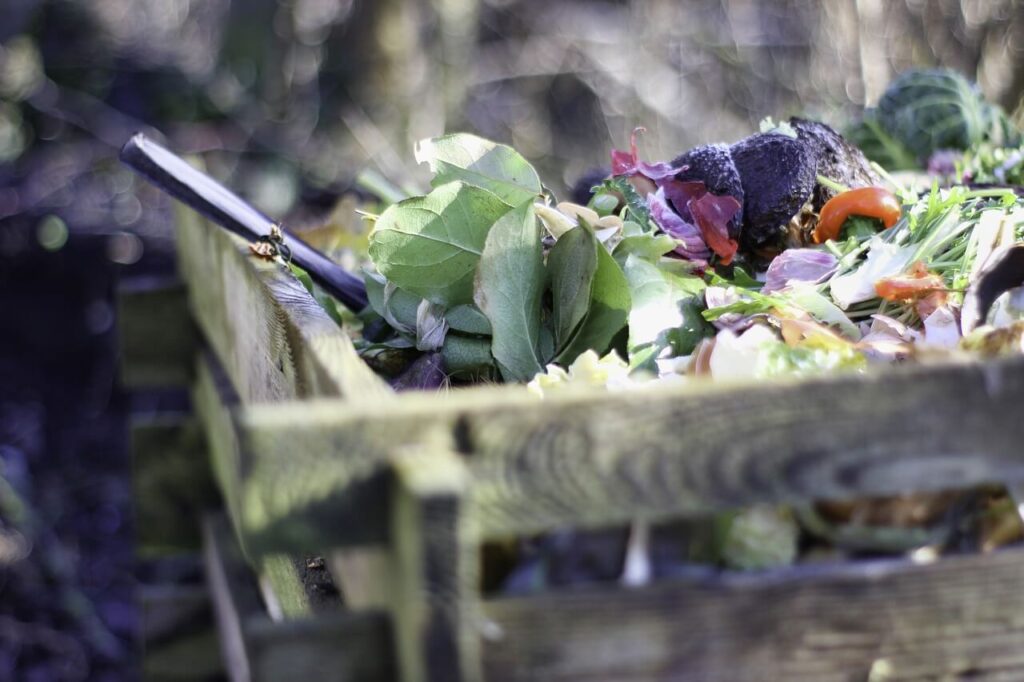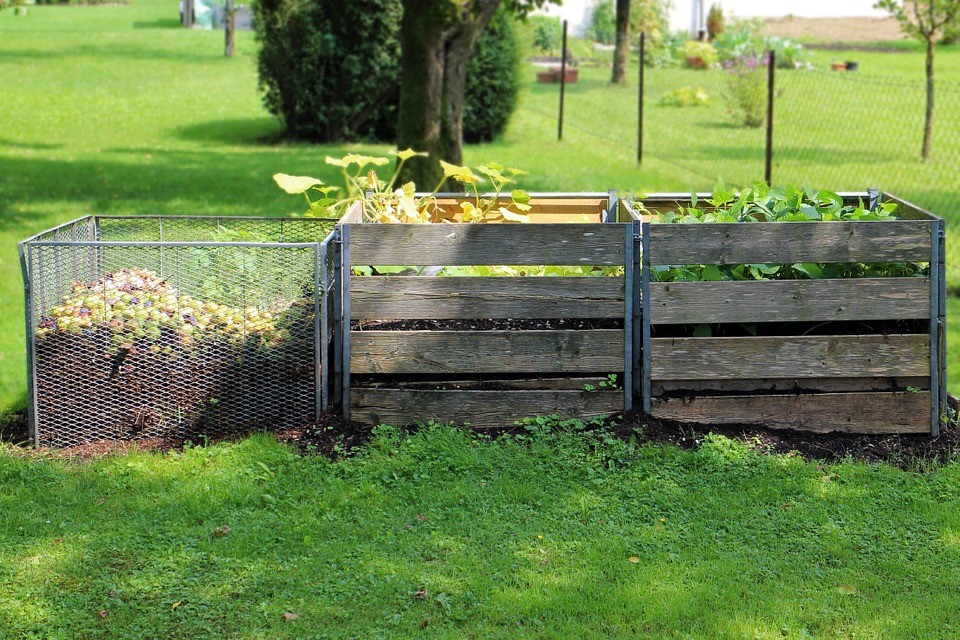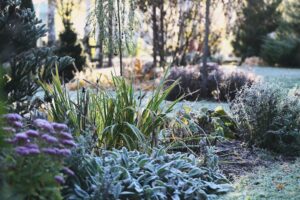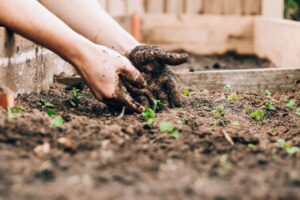Making your own compost at home is a great way to save money and help the environment. We’ve put together a handy guide on how to make garden compost at home.
Here at Earth Cycle, we make a lot of compost. In fact, each year we divert around 100,000 tonnes of green waste from landfill, composting it to create over 50,000 tonnes of compost, topsoil and other soils and conditioners for use around the garden. So, you could say we know a thing or two about composting. But you don’t have to have a collection of JCBs and a former WW2 airfield to get composting. It’s simple to use your own green waste at home to create nutrient-rich soil for pots, beds and veg patches.
Why make your own garden compost?
There are lots of reasons for composting at home. First, and probably more importantly, it’s free! It doesn’t need to cost you a penny – all you need is green waste, a little bit of dedicated space and some time. Even a green bin collection service from your council comes with a cost so keeping your offcuts and clippings at home and letting them mulch down into usable compost is a terrific way to save money. The resulting product is usable compost, which you’d otherwise have to purchase.
Alongside saving yourself the cost of a bag or two of compost, other good reasons for making your own compost include:
- Helping the environment – just like us, you’ll be doing your bit for the environment. Each year, millions of tonnes of green waste hit landfill sites across the country, unnecessarily. This requires trucks to move it and costs councils millions to dispose of.
- You know what’s in it – because we take our green waste from a range of sources, we have to have specialist screening and grading machines. Our compost is also strictly monitored and controlled to ensure only the best quality product arrives with our customers. If you’re composting at home there’s no need for all this kit because you know exactly what goes into it. You can carefully control the process and the content, ensuring you too create the best quality compost.
- It’s there when you need it – our pallet network is great at delivering bulk bags within a few days. There’s only one thing better – having a ready supply on hand to be used whenever and wherever you need it. Whether in the garden or on the allotment, once you’re up and running you’ll have a fresh, year-round supply of compost ready to go.
- Great for mulching beds – there’s no need to wait until the waste is broken down to granular soil consistency. Well-rotted compost can still be used to mulch beds or dig into soils to help break it down.
- Satisfaction – there’s something very satisfying about producing something yourself; the time and work that goes into it and the output it creates.
Top tips for home composting
As you can see, there are lots of benefits to making your own garden compost. Here are our top tips for home composting:
- Decide how/where to make your composter – you’ll probably want your compost to be discreet so pick a space and decide how you’re going to make your compost. You can buy open bottomed composters, hotboxes or rolling composters. Or you can simply make your own. By doing this you’ll have a dedicated space for making your compost.
- Introduce heat – the core temperature in the compost needs to reach 60-80⁰C so that it kills off any weeds and seeds. The soil will naturally achieve this, but you can help it on the way. Off-the-shelf composters will be fine, but if you’re using an open top composter or a compost heap, you may want to use black polythene sheeting over the top. This will absorb heat from the sun and retain and trap naturally occurring heat underneath.
- Add grass in the mix – grass breaks down the fastest, so any lawn clippings will speed along the process.
- Chop to increase surface area – the greater the surface area of the green waste the faster it will break down. Chop clippings and offcuts as small as you can or if you have a shredder, run it through first.
- Keep it moist – like a fire triangle, compost needs heat, food, and moisture to achieve the best results. If you’re using an open-top composter or heap, you should be fine with dew or rain. Off-the-shelf composters tend to generate moisture from the enclosed space. But in either situation, if it’s a dry mix of green waste or the height of summer, you may need to help things along a little.
- Avoid rodents – don’t add food products. While adding potato peelings and raw food waste helps reduce landfill, these can attract mice and rats. You may not be bothered by their presence, but they are often the one thing gardeners want to avoid.
- Mow the leaves up – autumn leaves are great for adding rich humus and lightening the structure. They can take time to break down, especially as they come at a time when the air temperature is dropping. To increase the surface area, and help the process, run the mower over them before they get too wet.

What can you put in your garden compost?
When it comes to what you can put in your garden compost, there are two main types of material you can add:
- Green – these are soft and leafy materials such as grass clippings, crop waste, weeds, fruit and vegetables and peelings. These types of green materials are rich in nitrogen.
- Brown – Hedge trimmings, straw, and dried leaves are examples of brown materials. Shredded paper and cardboard can also be added to your garden compost. Brown materials are rich in carbon.
To achieve the best environment for bacteria and micro-organisms to help produce your compost, there is an ideal balance between green and brown waste to consider:
Roughly, aim for between 25-50% of green compost and 50-75% of brown compost. The purpose of this is to ensure that there is a balance between the materials and that one doesn’t dominate the other. If you have more grass clippings than brown waste, the grass will rot and become slimy, so make sure you have a good balance of green and brown materials to mitigate this.
What not to put in your compost
There are some items you shouldn’t add to your compost. Don’t add diseased plants, glossy paper, weeds that have seeds, treated wood and large branches or meat/bones.
If you stick with the suggested green and brown waste, then you shouldn’t have any problems with your compost
How often do you have to turn compost?
Turning the compost is important as it helps to introduce air to help break up large clods. You should aim to turn your compost several times a year to ensure the compost doesn’t get too compacted, which slows the process due to the lack of air.
If you’re building your own composter, make two bays and flip your heap between the two. Off-the-shelf composters, except the rolling options, are a little harder to turn. If you go down the conical open bottom composter route, then you can lift it, move it to a nearby spot and then reload the compost pile you’ve revealed.
How long does it take to make compost?
Generally, it takes between six months to two years for compost to be ready to use. You can usually tell if it is ready if it is dark brown and has a soil-like texture. If there are clumps of uncomposted materials left, you can always pick these out and pop them back in your pile. You can help the composting along by turning it to add air, keeping it moist.
Earth Cycle compost
Making your own compost is a rewarding and money-saving way to keep your garden healthy and thriving. However, it does take a while before it is ready to use! If you can’t wait, then Earth Cycle has all the compost you need. Our composts are organic, peat-free, and compliant with PAS100 standards, giving you the nutrients your garden needs to flourish. Order your composts online for free delivery across the UK.




